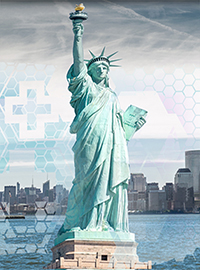| It's Fine to Talk About How This Crisis Ends |
 |
|
By David Harsanyi
Friday, March 27 2020 |
If I followed all my doctor's instructions to the letter, life would be excruciating. It would be tantamount to having Michael Bloomberg make my life choices, which is to say my life wouldn't be worth living. Human beings have never been as risk-averse as experts want them to be. We instinctively calculate the costs and benefits of engaging in activities that put our health at risk every day. The coronavirus crisis, in fact, has been one of the few times in my life I've allowed medical experts to completely dictate my actions. I'm writing this piece bunkered down in my home office, staying inside as much as possible, employing a rigorous hand-washing regime and keeping far away from my now-menacing neighbors when I walk the dog. Like many Americans, I do this not only for my own well-being but for the well-being of those who are at greater risk. I'm one of the lucky ones: I have a job and can work from home. Millions of others don't share that luxury. Many of them are calculating the costs of self-quarantining as it relates to their livelihood, businesses and futures – and those are completely sane, unimpeachable considerations. Yet, I've noticed pundits and politicians trying to shut down difficult discussions of the tradeoffs associated with managing the coronavirus crisis and its economic fallout by demanding that everyone shut up and listen to "doctors" and "scientists," as if no one else's opinion was useful. Let's set aside the fact that many liberals have spent the past decade degrading the gravity of "science," a word now most often used by pundits to make wild, Malthusian claims about climate change or argue that there are more than two genders. Even if they hadn't, science is just one aspect of any equation: We should listen to scientists, but not only to scientists. If all scientists agreed on how the United States should move forward in combating the current pandemic, which they don't, that still wouldn't be the end of the story. Virologists and epidemiologists concern themselves with the spread of disease and the physiological health of human beings, which is naturally of paramount importance right now. But economists concern themselves with whether those who survive the disease will have houses to live in after it's all over, which matters quite a bit, too, as do pundits' concerns about the violation of civil liberties and law enforcement officials' concerns about the possibility of rising criminality. Science is most meaningful when we consider it together with morality, economic prosperity, human thriving and thousands of other factors that make our lives bearable. Those considerations don't dissipate simply because a new virus shows up. Mankind has dealt with pandemics for thousands of years. Moreover, Americans deserve a full discussion of what a glide path to normalcy might look like. President Trump says he'd like to see the economy "raring" to go in two weeks. That seems highly optimistic. Former Fed chair Ben Bernanke says that if "not too much damage (is) done to (our) workforce and businesses during (this) shutdown, we could see a fairly quick rebound. Much closer to a major snowstorm" than the Great Depression, which would be tremendously encouraging if there weren't so many unknowns still in play. One thing that's certain is that we need to start talking about the endgame here, and about the point at which the cure might become worse than the disease. No one can say with any certitude how this plays out yet, but asking these questions isn't kooky, out of bounds or unpatriotic; it's natural. The longer this goes on, the more the public will want answers. And doctors alone won't be able to provide them. David Harsanyi is a senior writer at National Review and the author of the book "First Freedom: A Ride Through America's Enduring History With the Gun." COPYRIGHT 2020 CREATORS.COM |
Related Articles : |
























